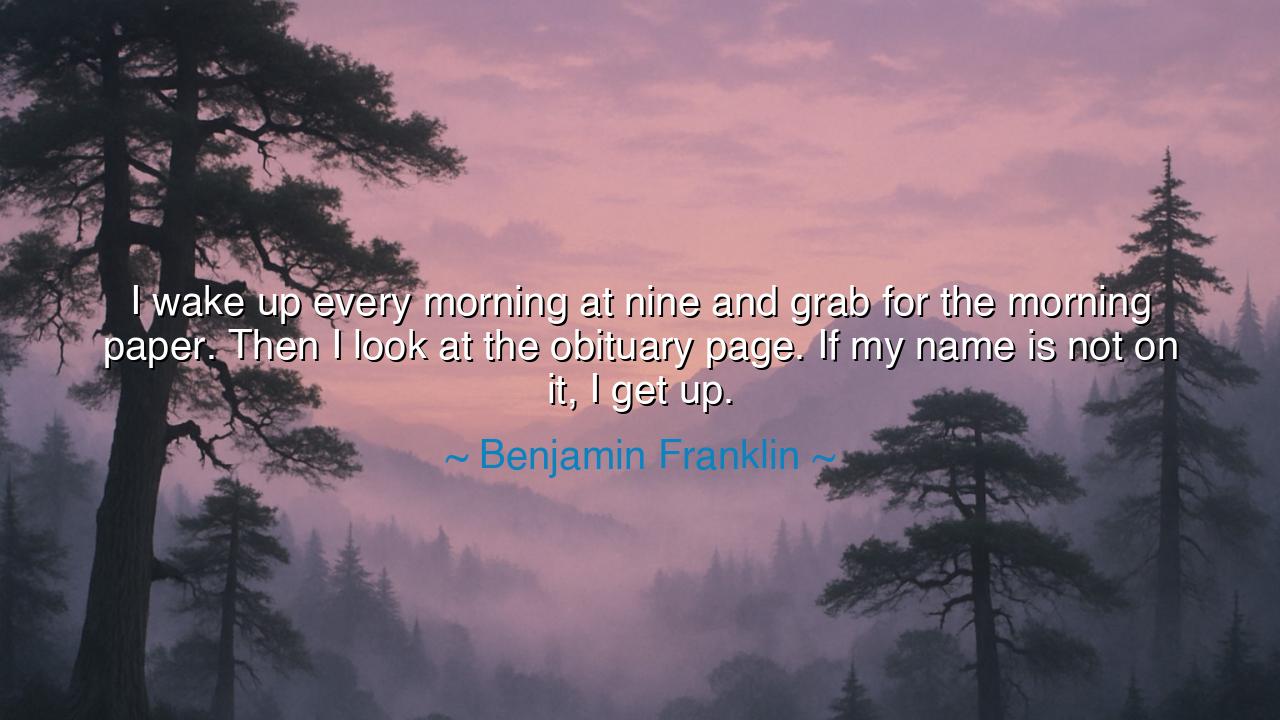
I wake up every morning at nine and grab for the morning paper.
I wake up every morning at nine and grab for the morning paper. Then I look at the obituary page. If my name is not on it, I get up.






In the words attributed to Benjamin Franklin, we are given a jesting yet profound reminder: “I wake up every morning at nine and grab for the morning paper. Then I look at the obituary page. If my name is not on it, I get up.” At first glance, it is a line of humor, tinged with the wit for which Franklin was so well known. But beneath the jest lies the timeless wisdom of mortality, a teaching that the ancients themselves would have clothed in solemn robes: that each day not marked by our name among the dead is a gift, an unearned opportunity to rise, to labor, and to live.
This quote belongs to that long tradition of men who laughed at death in order to master their fear of it. Franklin, who spoke often of thrift, virtue, and the fleeting nature of life, used the image of the obituary not merely as a joke but as a daily ritual of gratitude. For when he says, “If my name is not on it, I get up,” he is telling us: Rejoice, for the shadow has passed over you this morning. You have been granted one more sunrise. The ancients called this memento mori—the remembrance of death—not to darken the spirit, but to sharpen it like steel against the stone of awareness.
History is filled with souls who lived by this principle. Consider the life of Marcus Aurelius, emperor and philosopher, who in his Meditations wrote: “You could leave life right now. Let that determine what you do and say and think.” He, like Franklin, urged men not to waste a single dawn. Or recall the tale of Horace, who in ancient Rome proclaimed “Carpe diem”—seize the day—for tomorrow is not promised. Franklin’s quip is but another face of this ancient wisdom, cloaked in laughter, that the fragile boundary between today and eternity should remind us to live fiercely.
Think also of the soldier who walks into battle at dawn. He does not know if his name will be carved in stone by nightfall, and yet he lifts his weapon, he presses forward, he breathes deeply of life. Such was the spirit of the Spartans at Thermopylae, who fought though they knew death awaited them. They awoke that morning, and like Franklin centuries later, they might have thought: If my name is not yet among the fallen, then I will rise, and I will act.
The lesson here is not merely to laugh at death, but to embrace life. How many rise each day without thought, trudging through routine as though time were infinite? But Franklin reminds us that each day is not guaranteed, and that recognition must birth gratitude. To wake is not a small thing—it is a triumph. And if our name is absent from the list of the departed, we are debtors to the day, bound to spend it with purpose.
Thus, the practical action is clear: each morning, pause and remember this truth. When the sun pierces the window, ask yourself: My name is not among the dead—what, then, shall I do with this gift? Let this question stir you to kindness, to labor, to creativity, to courage. Let it silence petty complaints, for what is annoyance compared to the treasure of breath? This is Franklin’s true teaching hidden beneath his wit: to awaken with joy, because the earth has not yet swallowed your name.
In the end, this quote is a song of life disguised as jest. It is a challenge whispered by the dawn: “You live still. Rise, and do not squander the day.” And so let us walk in the path of Franklin and the ancients, carrying in our hearts the strange gladness of mortality. For when we live as though today might be our last, we live as though today is truly our first.






AAdministratorAdministrator
Welcome, honored guests. Please leave a comment, we will respond soon